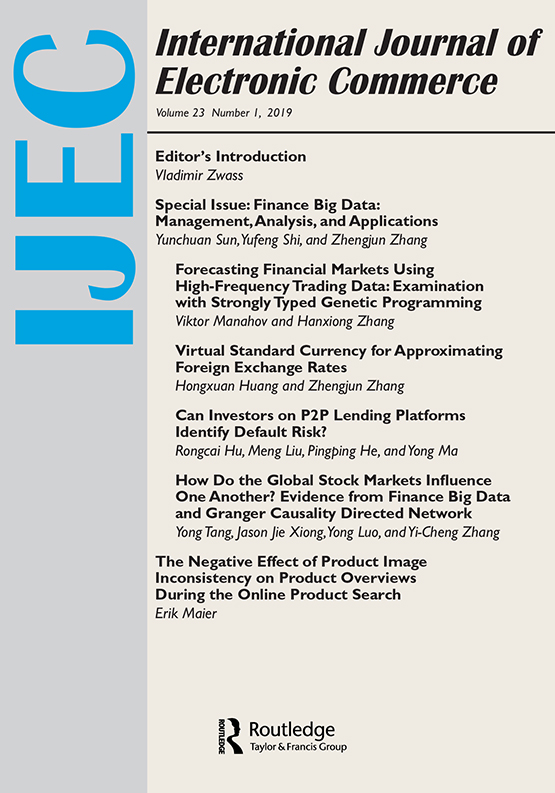编辑简介
IF 3.8
3区 管理学
Q2 BUSINESS
International Journal of Electronic Commerce
Pub Date : 2021-10-02
DOI:10.1080/10864415.2021.1967004
引用次数: 0
摘要
互联网在全球范围内的广泛使用赋予了个人作为公民、消费者的权力,或者只是更充分地做自己。人们获取信息的能力超过了几十年前国家元首或行业领袖的能力。社交能力,尽管是虚拟的,或者通过社交媒体影响他人的能力,超过了当时的任何可能。电子商务领域内的交易可供性呈指数级增长,并且正在快速增长。此外,所有这些功能正在全世界通用的平台上完全集成。新的习惯、规范、法律和法规都已成为法律。我们的研究探索了这种转变的多方面结果和后果。随之而来的现象之一是共同创造,定义为“消费者和生产者参与市场价值的创造”([3],第13页)。获得开源资源进一步增强了个人作为创造者、设计师、创造者、公民科学家或创意者的能力。仅举一个最近的例子,基于神经网络的蛋白质结构及其功能预测系统AlphaFold上个月已被DeepMind(谷歌公司)列入公共领域[1]。这可以使合格的个人在高智力水平上为公司的努力做出贡献。企业接触这些个人极大地有利于那些能够利用这些个人的组织。[3]中确定的两大类共同创造是个人和社区的自主共同创造,在这两类共同创造中,主动权和代理权属于他们,以及公司赞助的共同创造,即个人在生产者的要求下行事。如果做得好,赞助共创可以极大地扩展公司的组织知识,有助于其组织学习,并提高其人力资源管理的灵活性。在广泛理解的各种共创活动中,公司赞助的在公司网站上进行的在线共创头脑风暴(COCB)是代表公司活动利用外部人员集体智慧的一种常见形式[2]。一系列激励因素可以提高捐款的数量和质量。内在激励因素和外在激励因素之间有区别,这是一个重要的区别,尽管有时很模糊(想想一个人通过行动学习或通过贡献获得声誉)。当赞助公司制定了薪酬等外部激励因素时,有一个学术机构声称会挤出共同创造的内在动机。在本期的开篇文章中,Siddharth Baswani、Anthony M.Townsend和Andy Luse以一家公司赞助的持续众包网站的形式,研究了经济激励对COCB参与意向的影响。这个本文章由计算机程序翻译,如有差异,请以英文原文为准。
Editor’s Introduction
The advent of the Internet into mass global use has empowered individuals in their roles as citizens, consumers, or just being themselves more fully. People ́s access to information exceeds the capabilities of the heads of state or industry captains of just a few decades ago. The ability to be social, albeit virtually, or to influence others via social media, exceed anything possible then. The transactional affordances within the broad realm of ecommerce have grown exponentially and are growing apace. Moreover, all these capabilities are becoming fully integrated on platforms commonly available throughout the world. The new habitus, norms, laws, and regulations are in statu nascendi. Our research explores the multisided outcomes and consequences of this transformation. One of the consequent phenomena is co-creation, defined as “the participation of consumers along with producers in the creation of value in the marketplace” ([3], p. 13). Access to open-source resources further enhances the ability of individuals to act as creators, designers, makers, citizen scientists, or ideators. To use just one very recent example, AlphaFold, a neural-network based system for predicting protein structure and thus its function, has been placed last month in the public domain by DeepMind (a Google company) [1]. This can enable qualified individuals to contribute to corporate efforts at a high intellectual level. Corporate access to such individuals vastly benefits the organizations that enable themselves to take advantage of it. The two principal categories of co-creation identified in [3] are the autonomous co-creation by individuals and communities, where the initiative and the agency rests with them, and company-sponsored co-creation, where the persons act at the behest of producers. When done properly, sponsored co-creation can vastly expand a firm’s organizational knowledge, contribute to its organizational learning, and enhance the flexibility of its human resource management. Among the great variety of broadly understood cocreation activities, company-sponsored online co-creation brainstorming (COCB) conducted on a firm’s site, is a frequent format of harnessing collective intelligence of outsiders on behalf of the corporate activities [2]. A range of motivators can serve to enhance the quantity and quality of contributions. Distinction is drawn between intrinsic and extrinsic motivators, an important difference, although fuzzy at times (think of an individual’s learning by doing or acquiring a reputation by contributing). There exists a body of scholarship asserting the crowding out of the intrinsic motivation to co-create when extrinsic motivators, such as remunerations, are enacted by the sponsoring company. In the opening paper of the issue, Siddharth Baswani, Anthony M. Townsend, and Andy Luse study the impact of financial incentives on the participation intention in COCB, in a format of ongoing crowdsourcing sites sponsored by a company. The
求助全文
通过发布文献求助,成功后即可免费获取论文全文。
去求助
来源期刊

International Journal of Electronic Commerce
工程技术-计算机:软件工程
CiteScore
7.20
自引率
16.00%
发文量
18
审稿时长
>12 weeks
期刊介绍:
The International Journal of Electronic Commerce is the leading refereed quarterly devoted to advancing the understanding and practice of electronic commerce. It serves the needs of researchers as well as practitioners and executives involved in electronic commerce. The Journal aims to offer an integrated view of the field by presenting approaches of multiple disciplines.
Electronic commerce is the sharing of business information, maintaining business relationships, and conducting business transactions by digital means over telecommunications networks. The Journal accepts empirical and interpretive submissions that make a significant novel contribution to this field.
 求助内容:
求助内容: 应助结果提醒方式:
应助结果提醒方式:


